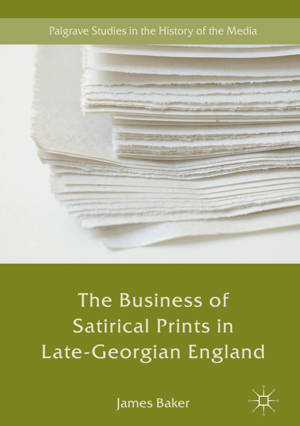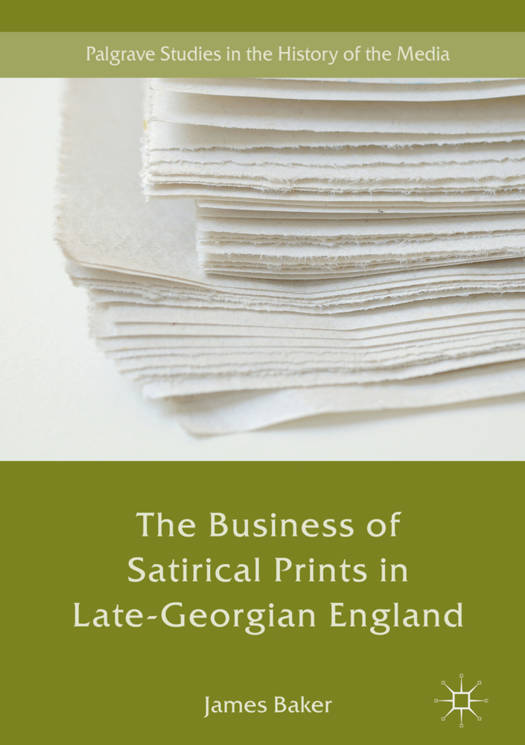
Bedankt voor het vertrouwen het afgelopen jaar! Om jou te bedanken bieden we GRATIS verzending (in België) aan op alles gedurende de hele maand januari.
- Afhalen na 1 uur in een winkel met voorraad
- In januari gratis thuislevering in België
- Ruim aanbod met 7 miljoen producten
Bedankt voor het vertrouwen het afgelopen jaar! Om jou te bedanken bieden we GRATIS verzending (in België) aan op alles gedurende de hele maand januari.
- Afhalen na 1 uur in een winkel met voorraad
- In januari gratis thuislevering in België
- Ruim aanbod met 7 miljoen producten
Zoeken
The Business of Satirical Prints in Late-Georgian England
James Baker
€ 152,95
+ 305 punten
Uitvoering
Omschrijving
This book explores English single sheet satirical prints published from 1780-1820, the people who made those prints, and the businesses that sold them. It examines how these objects were made, how they were sold, and how both the complexity of the production process and the necessity to sell shaped and constrained the satiric content these objects contained. It argues that production, sale, and environment are crucial to understanding late-Georgian satirical prints. A majority of these prints were, after all, published in London and were therefore woven into the commercial culture of the Great Wen. Because of this city and its culture, the activities of the many individuals involved in transforming a single satirical design into a saleable and commercially viable object were underpinned by a nexus of making, selling, and consumption. Neglecting any one part of this nexus does a disservice both to the late-Georgian satirical print, these most beloved objects of British art, and to the story of their late-Georgian apotheosis - a story that James Baker develops not through the designs these objects contained, but rather through those objects and the designs they contained in the making.
This book explores English single sheet satirical prints published from 1780-1820, the people who made those prints, and the businesses that sold them. It examines how these objects were made, how they were sold, and how both the complexity of the production process and the necessity to sell shaped and constrained the satiric content these objects contained. It argues that production, sale, and environment are crucial to understanding late-Georgian satirical prints. A majority of these prints were, after all, published in London and were therefore woven into the commercial culture of the Great Wen. Because of this city and its culture, the activities of the many individuals involved in transforming a single satirical design into a saleable and commercially viable object were underpinned by a nexus of making, selling, and consumption. Neglecting any one part of this nexus does a disservice both to the late-Georgian satirical print, these most beloved objects of British art, and to the story of their late-Georgian apotheosis - a story that James Baker develops not through the designs these objects contained, but rather through those objects and the designs they contained in the making.
This book explores English single sheet satirical prints published from 1780-1820, the people who made those prints, and the businesses that sold them. It examines how these objects were made, how they were sold, and how both the complexity of the production process and the necessity to sell shaped and constrained the satiric content these objects contained. It argues that production, sale, and environment are crucial to understanding late-Georgian satirical prints. A majority of these prints were, after all, published in London and were therefore woven into the commercial culture of the Great Wen. Because of this city and its culture, the activities of the many individuals involved in transforming a single satirical design into a saleable and commercially viable object were underpinned by a nexus of making, selling, and consumption. Neglecting any one part of this nexus does a disservice both to the late-Georgian satirical print, these most beloved objects of British art, and to the story of their late-Georgian apotheosis - a story that James Baker develops not through the designs these objects contained, but rather through those objects and the designs they contained in the making.
Specificaties
Betrokkenen
- Auteur(s):
- Uitgeverij:
Inhoud
- Aantal bladzijden:
- 232
- Taal:
- Engels
- Reeks:
Eigenschappen
- Productcode (EAN):
- 9783319499888
- Verschijningsdatum:
- 21/04/2017
- Uitvoering:
- Hardcover
- Formaat:
- Genaaid
- Afmetingen:
- 161 mm x 221 mm
- Gewicht:
- 421 g

Alleen bij Standaard Boekhandel
+ 305 punten op je klantenkaart van Standaard Boekhandel
Beoordelingen
We publiceren alleen reviews die voldoen aan de voorwaarden voor reviews. Bekijk onze voorwaarden voor reviews.









